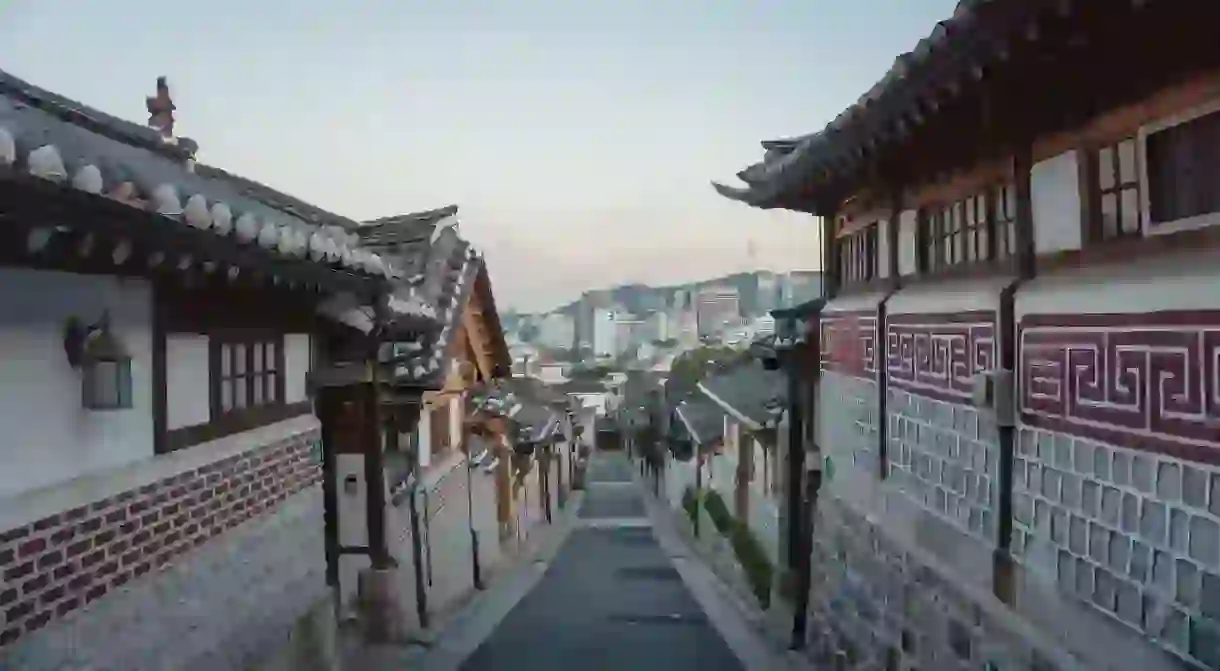The 12 Best Things to Do in Insadong, Seoul

Insadong, a buzzy neighbourhood in Seoul, is a must-visit destination for first-timers in South Korea‘s capital. Its main drag, Insadong Street, is best-known for its traditional tea houses and street food scene, while the wider area is filled with unmissable attractions like the Alive Museum and Huwon Secret Garden. Culture Trip curates your guide to this Seoul neighbourhood – including the top experiences to add to the itinerary.
Insadong Street
Shop
Insadong Street, the beating heart of this neighbourhood, close to Anguk Station, boasts a lively atmosphere and eclectic shops to keep you busy. Soak up the sights, sounds and smells of this pedestrianised strip before dipping into the little alleyways that run off it, where you’ll find dozens of galleries showcasing pieces to suit all tastes – from traditional Korean fine art to zany contemporary installations. Keep up your energy levels with a pit-stop at one of the many tea houses or top-rated restaurants. Be sure to visit Museum Kimchikan, which pays homage to one of the staples of Korean cuisine: kimchi.
Sulbing
Cafe, Restaurant, Dessert Shop, Korean, Dessert
Get a sweet fix at this casual café that serves up being – Korea’s sweet and creamy answer to shaved ice. The artful desserts will brighten up your Instagram, while the portion sizes are generous so make sure you leave room before you head over. There are dozens of flavours to choose from, with mango and strawberry being two of the most popular choices, and the ice is finished with syrup and a range of toppings.
Cheonggyecheon Stream
Natural Feature

Jogyesa Temple
Buddhist Temple
The Jogyesa Temple, a five-minute walk from Insadong, is a charming spot to visit for its sacred architecture and stunning gardens. The Buddhist site, nestled amid towering skyscrapers, was established in the 14th century, with the current building dating from 1938. The exterior of the temple is awash with a kaleidoscope of colour, and inside you’ll find three huge golden Buddhas. Entry is free, and the temple is open all-year-round, but the gardens are particularly beautiful in the spring.
Bukchon Hanok Village
Archaeological site

Gyeonghuigung Palace
Museum

Continue your cultural tour with a stop at Gyeonghuigung Palace, which is around a 10-minute walk from the Gyeongbokgung subway station. This was one of five royal residences built during the 17th century by the Joseon Dynasty, and there were more than 100 buildings within the complex when it was finished. Most of these structures were destroyed over the years – but ongoing conservation efforts have restored around a third of Gyeonghuigung Palace to its former glory. Spend a few hours wandering through the grounds, with highlights including the Geumcheongyo Bridge, the Heunghwamun Gate and the Sungjeongjeon Throne Hall.
Huwon Secret Garden
Park, Botanical Garden
Take a moment to stand still and soak up the peaceful surroundings of this beautifully landscaped garden, which is accessible via Changdeokgung Palace. You’ll need to book on a 90-minute guided tour to visit the secluded spot, but it’s well worth taking the extra time. Some of the highlights include a small pond, several photogenic pavilions and various specimens of trees that date back more than 300 years. Autumn is the prettiest time of year to visit, with a patchwork of different colours forming as the leaves start to fall.
Knife Gallery Seoul
Shop, Museum
If you’re looking for a more off-the-wall tourist attraction, stick your head into the Knife Gallery. The store, which is in the heart of Insadong down a small alley near the Anguk subway station, showcases thousands of bladed weapons – from Japanese samurai swords to the Korean equivalent known as geom. Along with decorative implements, there are also kitchen knives and multi-tools for sale.
Cheonggye Plaza
Art Gallery
Pop over to Cheonggye Plaza to see one of Seoul’s most striking public art pieces. The open space, which is the beginning point of Cheonggyecheon Stream and close to the Gwanghwamun subway stop, acts as a canvas for the Spring Sculpture. This shell-shaped artwork, created by Dutch artist Coosje van Bruggen and Swedish artist Claes Oldenburg, makes for a great photo opportunity come day or night. There is also a two-tier waterfall on the plaza, a synchronised fountain and a miniature model giving a bird’s-eye-view of the stream that was once covered by a highway.
Ssamziegil Market
Market
Thank Ssamziegil Market for creating a bustling atmosphere on Insadong Street. This part shopping centre, part outdoor bazaar comprises over 70 shops across four floors, and features everything from local handcrafts, like ceramics and furniture, to traditional Korean goods and clothing. Make a morning of it and enjoy a pit-stop at its well-loved toilet-themed “poop” café on the top floor.
Alive Museum
Museum
Shin Old Tea House, Seoul
Tea Room, Tea
Insadong is know for its tea houses – and Shin Old Tea House, tucked away down an alley off the main street, is the best place to discover it. Enjoy teas such as plum and ginger, plus sweet treats including rich rice cakes and puffed rice. This authentic tea house is small and cosy with floor seating exclusively – as you’d expect to find in a traditional Korean tea house.
This is an updated version of an article by Sekilah Calvin.













